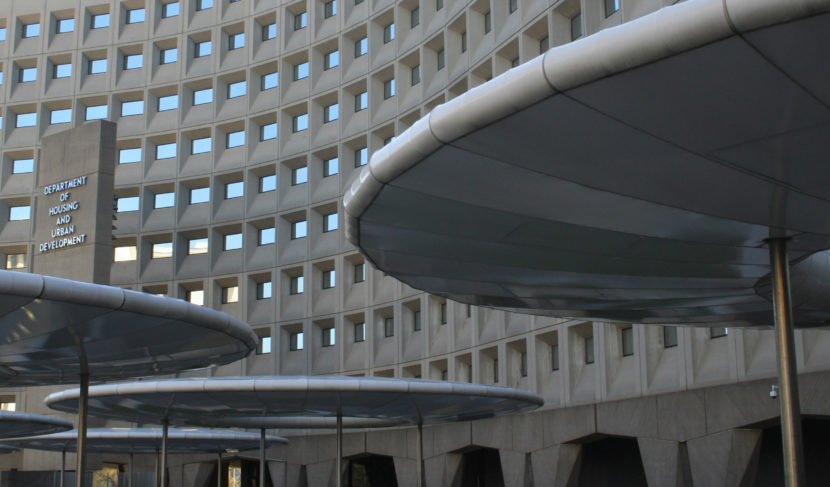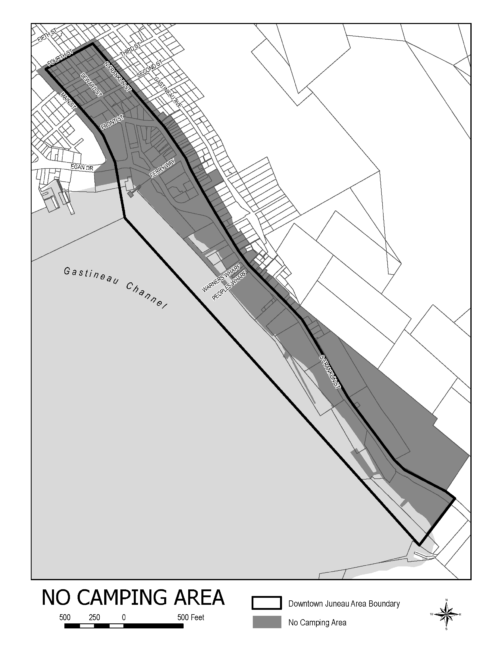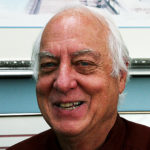
An ordinance to ban the homeless from camping in the downtown core continues to generate controversy. Now there’s questions over whether a ban could affect the community’s access to federal housing dollars.
There’s been a lot of outcry over a proposed ordinance that would ban homeless people from camping in Juneau’s downtown core. Proponents say it’s a public safety issue. Opponents say a camping ban would just move the problem around.
Juneau’s Downtown Business Association is itself divided within its membership. But a majority of its board members voted to support the initiative. That’s because many merchants and their employees report feeling increasingly unsafe by people who loiter and sleep in alcoves in the commercial center.
“The board made the decision that we were in support of the ordinance and I personally feel that was the right decision, not everybody on the DBA feels that way,” said Eric Forst, owner and manager of the Red Dog Saloon who penned the DBA’s letter of support for the ordinance.
He said it’s a complex problem and one that needs a lot of work.
“On either side of the issue we all feel that this not the silver bullet,” Forst said. “This is a step — there’s a lot more that needs to be done.”
He’s operated downtown businesses for about 20 years. There have always been homeless people around but that in the last 18 months or so it’s changed.
“(There’s) a younger, meaner more aggressive element that does not want to be helped — and that’s what this is targeted at,” he said.
In recent weeks a number of social care organization have testified that a camping ban wouldn’t solve anything and would waste police resources.
Homeless residents have also weighed in. Mary Bailey, 46, has recently been staying at the Glory Hole downtown shelter though she said she’s had to sleep by downtown storefronts.
“I mean, that’s the only thing that can protect us from the weather so I mean what’s going to happen?” Bailey said. “I mean, we need something what about a tent city? And if that law goes through, why don’t they put a tent city first?”
The city is working behind the scenes to identify a year-round campground. But that takes time. Rezoning would be at least several months away. City staff has proposed delaying any camping ban until mid-April when the city-run Thane campground reopens. It’s in an avalanche zone, so it closes down for the fall and winter.
Juneau Mayor Ken Koelsch, ordinance’s main proponent, said pushing the effective date to April 15 as a compromise. He’d like it to take effect earlier.
“We need to deal with our homeless problem,” Koelsch said. “We need to deal with our safety problem and we need to deal with both of them right now. And that’s the perspective I’m taking on it.”
Koelsch, elected last year in a special election, said merchants came to him with their concerns more than two months ago and he’s frustrated the Assembly still hasn’t taken action.
“As a former government teacher I thought government was a lot more responsive,” he said.
HUD funding could be affected
 The Alaska Coalition on Housing and Homelessness has warned that a camping ban targeting homeless people could imperil the community’s access to federal grant dollars.
The Alaska Coalition on Housing and Homelessness has warned that a camping ban targeting homeless people could imperil the community’s access to federal grant dollars.
“In Juneau we have two programs that are operated by St. Vincent de Paul to a total of $130,000 that has over 30 permanent supportive housing units in place,” said coalition Executive Director Brian Wilson.
Those funds come from the federal department of Housing and Urban Development, or HUD. In addition to these two resources, the new 32-bed Housing First shelter slated to open in May will likely be applying for federal funds to further expand. These federal dollars will likely be crucial, Wilson said, and when it comes to HUD reviewing grant applications in Washington. It’s a numbers game.
“The higher your score the more funding that you receive. The lower your score, you’re at jeopardy of losing funds,” Wilson said.
But could a camping ban really imperil federal funding? HUD, as a rule, doesn’t get involved in policy debates. But HUD officials would talk freely about what approaches to tackling homelessness they encourage — and discourage.
“Most of the evidence shows and most experts would agree that homelessness is not a crime, homelessness is a condition,” said HUD spokesman Lee Jones in Seattle. Congress has appropriated $1.9 billion nationwide for grants to communities dealing with homelessness. Typically 300 to 400 communities — both public agencies and private nonprofits — vie for a slice of the funds each year.
“It’s extremely competitive. $1.9 billion sounds like a lot of money, (but) we do have a fairly considerable homeless problem across the United States, in virtually every community large, small and in between,” Jones said.
How these communities — in HUD jargon they’re called Continuum of Care Programs — decide to deal with homelessness is definitely a factor, Jones said, when ranking funding requests.
“If the continuum has made efforts to essentially address homelessness as a condition rather than a crime they can score two extra points out of the 200 ideally they would need for a perfect application score,” he said.

This is an issue some Assembly members want answered before the ordinance goes to a vote next week and city staff are working on trying to get answers.
“I think in order to make that policy decision the Assembly needs to understand that impact,” City Manager Rorie Watt said.
As for Mayor Ken Koelsch, he’s said he’s talked to the city’s DC lobbyist and congressional staffers for clarification but hopes to get the ordinance passed regardless.
“That would disturb me greatly to find out that a city that tries to help its citizens deal with trespassers on private property would suddenly not be received in the same light and that we would definitely follow up on,” the mayor said.
The Juneau Assembly likely won’t take further oral testimony, but with a vote scheduled for Monday, a crowded house is expected.
